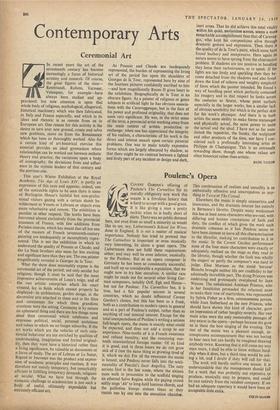Poulenc's Opera
••1% COVENT GARDEN'S offering of N Poulenc's The Carmelites for its / morally obligatory new work this ree-
season is a frivolous luxury that
,
dei is hard to accept with a good grace.
It is like giving a man a pretty t, necktie when he is badly short of 4' shirts. There was no public demand here, not even from so small a minority as would like to see, say, Liebermann's School for Wives done in England. It is not a matter of musical importance. Nobody has tried to pretend that The Carmelites is important or even musically very interesting, let alone a great opera. The Liebermann does not fulfil these requirements either, and may well be even inferior, musically, to the Poulenc. But as an opera composer in Germany he has been so consistently successful, and built up so considerable a reputation, that we ought now to try him ourselves. A similar case might be made out for several other living Ger- man composers, notably Orff, Egk and Henze— but not for Poulenc. The Carmelites has, it is true, had a fair popular success in several countries, which no doubt influenced Covent Garden's choice, but this has been as a freak, both as a contribution to modern opera in general and as a part of Poulenc's output, rather than as anything of real musical interest. Except for the total unexpectedness of Poulenc's writing a serious full-length opera, the music is exactly what could be expected, and does not add a scrap to our experience. Nine-tenths of it is French sweetness and refined banality, and the remaining one- tenth unassimilated foreign matter. Of its kind it is good, and in three hours we do not grow sick of it (not the same thing as growing tired of it, which we do). For all the sweetness the music is honest, and Poulenc never falls into the senti- mentality of Puccini's Suor Angelica. The only serious blot is the last scene, where the sixteen nuns walk in procession to the scaffold singing an ethereal Salve Regina while the gaping crowd softly sings `Ah' to long-held luscious chords, and the guillotine bumps sixteen times as they vanish one by one into the execution chamber. This combination of realism and unreality is as msthetically offensive and unscrupulous as any- thing in Tosca or The Consul.
Elsewhere the music is simply unassertive and innocuous, and the dramatic interest lies entirely in Bernanos's libretto. Despite many weaknesses this has at least some characters who are real, with differing and human conceptions of faith and duty, the conflict of which gives the work such dramatic cohesion as it has. Poulenc seems to have been Content to leave all this characterisation to the librettist, making no contribution to it in the music. In the Covent Garden performance none of the four main characters were exactly or adequately realised on the stage as they read in the libretto, though whether the fault was wholly the singers' or partly the composer's was hard to judge. Elsie Morison as the timid 'heroine' Blanche brought neither life nor credibility to her admittedly incredible part. The dying Prioress was undersung and grotesquely overplayed by Jean Watson. The unbalanced Assistant Prioress, who in her fanaticism persuaded the reluctant nuns to make their vow of martyrdom, was represented by Sylvia Fisher as a firm, commonsense person, while Joan Sutherland as the new Prioress, who should have shown this kind of character, gave an impression of rather haughty severity. Her two main arias were the only memorable passages of any extent in the opera—perhaps because she gave us in them the best singing of the evening. The rest of the music was a pleasant enough, in- conspicuous accompaniment that was not boring to hear once but can hardly be imagined drawing anybody twice. Knowing that it will come my way once more, I shall be able to listen without hard- ship when it does, but a third time would be ask- ing a lot, and I doubt if duty will call for that.
The work will hardly outlive one season. It is understandable that the management should fall for a work that was probably not expensive to produce, musically easy to prepare, and could be cast entirely from the resident company. If we had an adequate repertory it would have been an acceptable little extra.
COLIN MASON


































 Previous page
Previous page